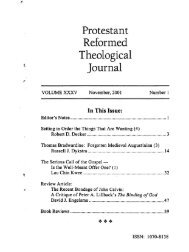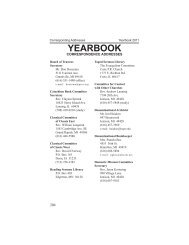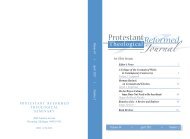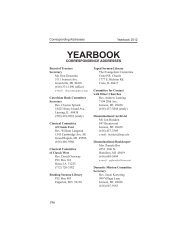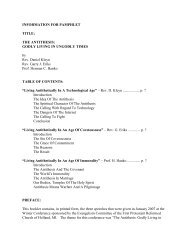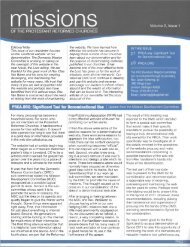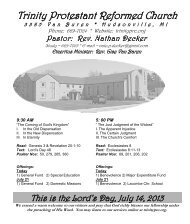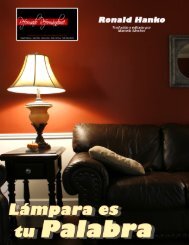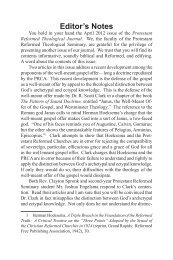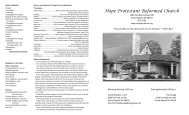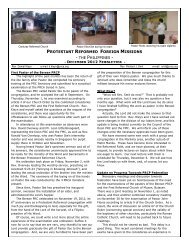November 2007 - Protestant Reformed Churches in America
November 2007 - Protestant Reformed Churches in America
November 2007 - Protestant Reformed Churches in America
Create successful ePaper yourself
Turn your PDF publications into a flip-book with our unique Google optimized e-Paper software.
Preparatory Grace <strong>in</strong> the Puritans<br />
led to faith were associated with God’s regeneration and could not be<br />
connected with man’s efforts at salvation. 22<br />
Although it would be unjust to group Ames with the Arm<strong>in</strong>ians<br />
(he very clearly opposed them 23 ), Ames’ position is a dangerous<br />
concession to the Arm<strong>in</strong>ian errors of resistible grace and partial<br />
depravity. We can be thankful that Ames’ views were not <strong>in</strong>corporated<br />
<strong>in</strong>to the Canons of Dordt. Sadly, the leaven of Amesian<br />
preparationism would <strong>in</strong>fluence generations of theologians as his<br />
Marrow became required read<strong>in</strong>g <strong>in</strong> the major theological schools<br />
<strong>in</strong> England, <strong>in</strong> the European cont<strong>in</strong>ent, and <strong>in</strong> <strong>America</strong>. 24<br />
C. Richard Sibbes (1577-1635)<br />
Richard Sibbes, writes Pettit, was much concerned with the<br />
work of the Spirit. He preached much on the subject, but “with a<br />
m<strong>in</strong>imum of concern for the rigors of dogma.” 25 He spoke <strong>in</strong> the<br />
service of “spiritual warmth.” In his sermons he sought to create<br />
a concern <strong>in</strong> his hearers for a change of heart. The purpose of<br />
theology is to “warm the heart,” not impart “cold, scholastic, dogmatic”<br />
truth, he ma<strong>in</strong>ta<strong>in</strong>ed. 26 Sibbes, differ<strong>in</strong>g from Perk<strong>in</strong>s,<br />
22. Ames, The Marrow, p. 50.<br />
23. Eusden writes, quot<strong>in</strong>g a biographer of Ames, “Ames pla<strong>in</strong>ly deserved<br />
our say<strong>in</strong>g <strong>in</strong> his honor what the mothers of Israel once said <strong>in</strong><br />
honor of David: ‘Other theologians have sla<strong>in</strong> their thousands, but Ames<br />
his tens of thousands!’ Ames was thought to be someth<strong>in</strong>g of a giant<br />
killer <strong>in</strong> theological debate,” The Marrow, p. 7.<br />
24. Eusden notes, “For a century and a half William Ames’s Marrow<br />
of Theology held sway as a clear, persuasive expression of Puritan belief<br />
and practice. In England, Holland and New England nearly all those<br />
who aspired to the Puritan way read the book. No matter what their<br />
aspirations, undergraduates at Emmanuel College, Leyden, Harvard and<br />
Yale had to read the Marrow <strong>in</strong> Lat<strong>in</strong> as part of basic <strong>in</strong>struction <strong>in</strong> div<strong>in</strong>ity.<br />
In a burst of enthusiasm Thomas Hooker (1586-1647) of Hartford<br />
once recommended the Marrow and another of Ames’s works to<br />
fellow clergymen: ‘They would make him (suppos<strong>in</strong>g him versed <strong>in</strong> the<br />
Scriptures) a good div<strong>in</strong>e, though he had no more books <strong>in</strong> the world,’”<br />
Ames, The Marrow, p. 1.<br />
25. Pettit, The Heart, p. 67.<br />
26. Pettit, The Heart, p. 67.<br />
<strong>November</strong> <strong>2007</strong> 65



